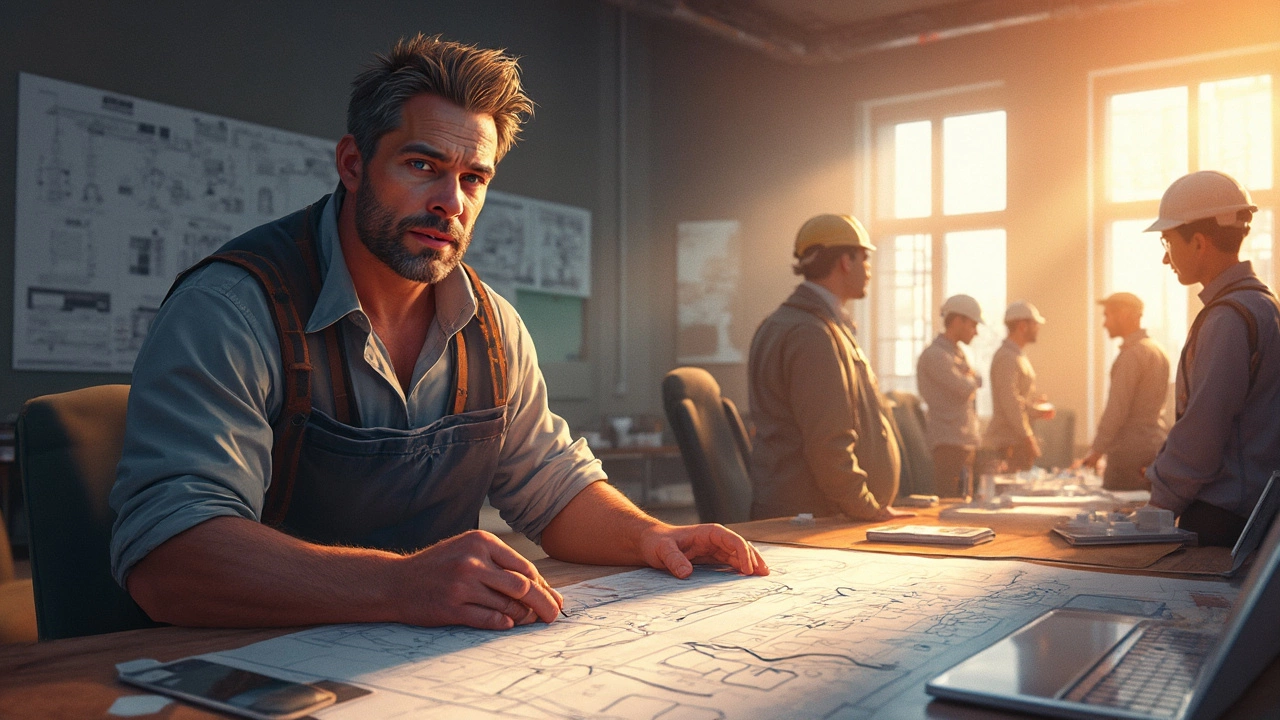So, what exactly does a general contractor do? If you've ever driven past a construction site and wondered about the behind-the-scenes magic, you're in the right place. The general contractor is basically the ringmaster of the construction circus, making sure everything goes according to plan. Imagine trying to bake a cake from scratch while keeping your kitchen spotless and coordinating an elaborate birthday party all at once. That's a tiny glimpse of what they do!
They are the unsung heroes who take on the big picture. They manage budgets, hire and oversee subcontractors, and ensure everything meets building codes and safety standards. It's like assembling a puzzle where every piece has to fit perfectly, except this puzzle has building permits and heavy machinery. They also deal with unexpected hiccups, because, let’s face it, life happens. Getting behind schedule or running into unforeseen problems is part of the ride.
- Role of a General Contractor
- Key Responsibilities in a Project
- Tips for Choosing the Right Contractor
- Interesting Facts and Myths
Role of a General Contractor
The general contractor is like the captain of the ship when it comes to steering a construction project. But instead of navigating waters, they're navigating budgets, timelines, and an ever-evolving list of tasks. Think of them as the point person who brings all the moving parts together to make a construction project happen smoothly.
Project Management Maestro
One of their main tasks is project management. It's their job to develop a project plan—including timelines, resources, and budget. Once that plan’s in place, they monitor progress to ensure everything is moving according to schedule. They’re like those puzzle masters who can see how every piece fits before anyone else does.
Coordination Kingpins
Contractors also act as a hub for all the information. They coordinate between the various subcontractors like electricians, plumbers, and carpenters. Imagine organizing a reunion for a very large, very diverse extended family, ensuring everyone knows where they need to be and when. That’s the kind of coordination a general contractor handles.
Compliance and Quality Control
Another significant responsibility is ensuring that everything meets the local building codes and regulations. This means conducting checks and balances throughout the project. They’re the folks who ensure that what’s being built isn’t just beautiful and functional but safe and compliant too. Skipping these steps can result in big fines or legal troubles down the road.
| Task | Description |
|---|---|
| Budget Management | They keep track of all expenses and stay within budget. |
| Time Management | Ensure that project milestones are met on schedule. |
| Risk Management | Identify and mitigate risks that could affect the project. |
At the end of the day, the role of a general contractor is crucial to turning blueprints into buildings. They juggle multiple responsibilities that ultimately lay the foundation for a project’s success. So next time you pass a construction site, you know who's making sure all the gears are turning!
Key Responsibilities in a Project
Being a general contractor isn't just about showing up on a construction site with a toolbox. Their role encompasses a variety of responsibilities that ensure the project's success.
Project Planning and Management
A general contractor kicks things off by meticulously planning the scope of the project. This involves discussing with architects and clients to set clear objectives. They also create detailed schedules to track project milestones—like a roadmap to completion. The idea is to keep everyone on the same page and avoid any surprises down the line.
Budgeting and Cost Control
One of their crucial tasks is managing the budget. This isn’t about just sticking to a plan; it's more like constantly calibrating between quality and cost-effectiveness. They handle negotiations for materials and manage funds, ensuring you don’t blow your entire budget in the first phase of construction. So yes, thank them for keeping things financially sane!
Hiring and Supervising Subcontractors
Ever wonder who’s in charge of all those specialized workers like plumbers, electricians, and masons? That’s right, it’s the general contractor. They hire subcontractors and make sure that each one performs to an acceptable standard. It’s something like assembling a top-tier sports team, then making sure every player is at the top of their game.
Ensuring Compliance and Safety
And let's not forget about all those rules and regulations. The contractor ensures everything adheres to local building codes and safety standards. Skimping here can lead to costly mistakes or, worse, unsafe structures. Nobody wants that, and a good contractor will have a checklist longer than a grocery list to make sure it’s all up to snuff.
Problem Solving on the Fly
Lastly, they’re problem solvers. When unexpected issues like delays in supplies or surprise weather conditions pop up, they pivot expertly. This adaptability keeps the project from stalling.
With all these responsibilities, it's clear why hiring the right general contractor is essential for successful construction. They're not just managers; they're the backbone that holds the entire thing together.

Tips for Choosing the Right Contractor
Picking the right general contractor is like finding a great partner for a dance. You want someone who knows the steps, can take the lead when needed, and ensures you don’t step on any toes. Here’s how you can nail down the right choice for your construction project.
Check Their Credentials
First things first, you need to make sure your contractor is legit. Look for current licenses and certifications. These aren’t just fancy pieces of paper; they show that the contractor knows their stuff and can legally run the show at your building site. Also, don’t forget insurance. It’s crucial that they have it to cover any accidents or damages that might pop up unexpectedly.
Review Their Experience and References
Experience speaks volumes. Ask them about the types of projects they’ve completed. A contractor who has built homes will have different experience than one who has worked solely on commercial buildings. Don’t hesitate to ask for referrals. Talking to past clients gives you a good idea of their work style and reliability. Were previous clients happy? Did they stick to the budget? It’s worth taking these reviews seriously.
Get Detailed Estimates
When it comes to cost, opt for detailed quotes, not vague ballpark figures. A professional contractor should provide a line-by-line estimate, covering everything from materials to labor. This transparency helps avoid unpleasant surprises down the line, like sudden costs for extra services.
Assess Communication Skills
Communication is key. Your contractor should be approachable and willing to answer questions. If you notice they’re dodging questions or seem unclear about details, that’s a red flag. You want someone who can explain complex construction jargon in a way that makes sense to you.
Trust Your Gut
Finally, trust your instincts. You need to feel comfortable with your contractor, as you’re going to spend a fair amount of time interacting with them. If something feels off, it probably is. Don’t rush the decision. Take your time to ensure this partnership will lead to a successful project.
Interesting Facts and Myths
Let's bust some myths and dive into the fascinating world of general contractors. They might seem like just the folks hanging around making sure the work gets done, but there's so much more to their role.
Fact: Multitasking Masters
Think about this: a single construction project might involve dozens of subcontractors, from electricians to plumbers. The general contractor is in charge of juggling all these different professionals, ensuring everyone knows what they're supposed to be doing and when. Picture a maestro conducting a symphony – everything needs to be in sync.
Myth: Only Big Projects Need One
Many people think you only need a general contractor for massive skyscrapers or big commercial builds. Not true! Even residential projects like home renovations need a contractor to keep things from falling through the cracks.
Fact: They Can Save You Money
Yep, hiring a general contractor might seem like an added expense, but they can actually save you money. They negotiate better rates with suppliers and subcontractors, prevent costly mistakes, and help keep the project on schedule.
Myth: They Only Manage Labor
While managing the workforce is a big part of their job, it's not their only responsibility. They're also dealing with permits, inspections, and ensuring compliance with building regulations. Miss one of these steps, and you might find yourself in a sticky situation.
Fact: They are Licensed Pros
The title of general contractor isn't just thrown around. It comes with credentials and licenses, ensuring they’re skilled and know all the ins and outs of the construction world. Always check this before you hire one.
In short, these are a few key aspects of what makes general contractors such essential players in the construction industry. It’s not just about managing a team; it’s about putting all the pieces of the puzzle together.





